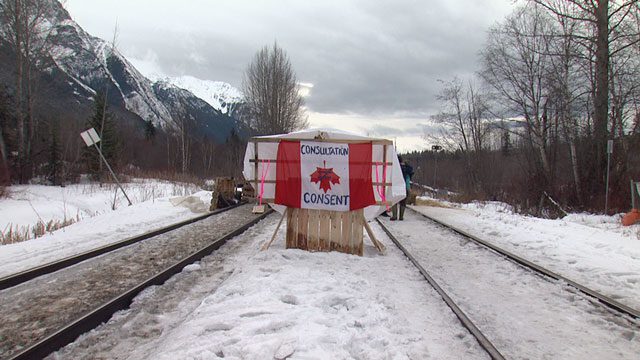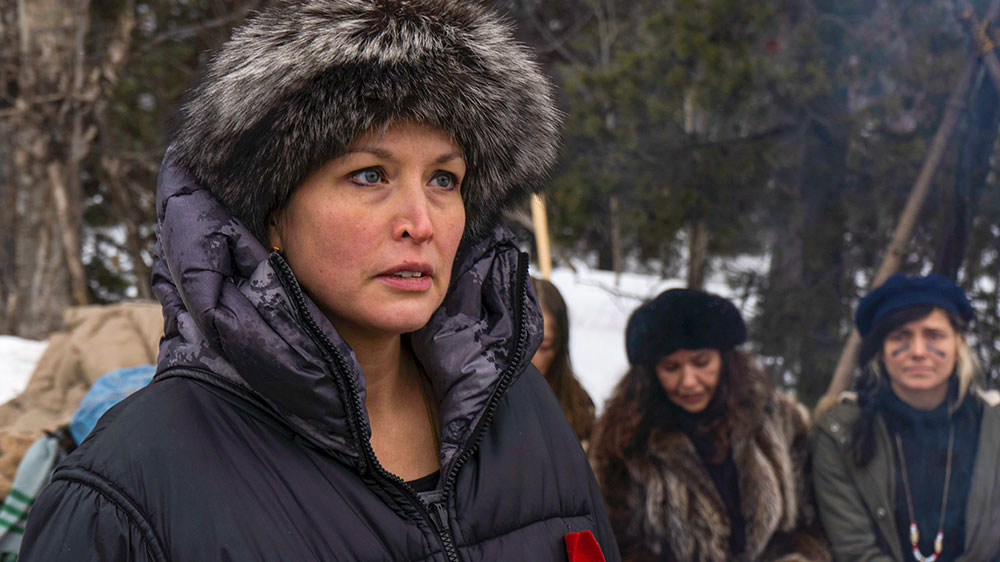
A Wet’suwet’en matriarch sees a new land rights proposal as key to restoring unity in her northwestern B.C. First Nation.
“We have a lot of healing to do,” said Bonnie George, a band member and former employee of Coastal GasLink (CGL), which is building a controversial $6.6-billion natural pipeline that will carry fracked natural gas through the territory.
“There was a lot of damage done in the past several years because of this.”
The negotiations with CGL, whose pipeline will cross northern B.C. on its way from Dawson Creek to a coastal shipping port in Kitimat, has divided the five Wet’suwet’en clans and even split families, George said Monday.
As a result, the nation moved away from traditional decision-making and was being represented “in an unfair manner” by members who were “not consulting with the membership,” she added.
The resource project was approved by the B.C. government and 20 elected band governments but not a majority of hereditary chiefs who say they speak for all the clans and support a group of opponents in one of the five clans.
The opposition of Unist’ot’en (Dark House) has stopped several earlier pipelines and aims to do the same with this one – despite a B.C. Supreme Court injunction granting CGL access to Dark House land south of Houston, B.C.
Watch Lee Wilson’s story on the talks between hereditary chiefs and the government
Unist’ot’en has clan members and allies at a checkstop (Gidimt’en) and healing camp along the Morice River Forest Service Road near CGL’s construction site, and its fight has inspired supporters across Canada to rally and stop train traffic.
Those rail delays continued Monday.
“We’re not standing down; we’re not asking other people to stand down,” said Molly Wickham, a spokesperson for Gidimt’en, in a video message posted Monday.
“But they don’t understand that this is not over.”
Wickham said the four-day meeting with B.C. and Canadian officials in Smithers, B.C, resulted in a draft agreement (that has not been made public) to award Wet’suwet’en rights and title to their traditional territory but did not resolve the pipeline standoff.

(Molly Wickham (Sleydo’) is a spokesperson for Wet’suwet’en Nation members and their allies who are fighting the CGL pipeline. APTN photo)
“The hereditary chiefs are opposed to any pipeline going through their territory,” confirmed hereditary Chief Woos (Frank Alec) at the meeting’s conclusion Sunday. “We maintained that from Day 1.”
Scott Fraser, B.C.’s Indigenous Affairs minister who was at the meeting table with federal Crown-Indigenous Relations Minister Carolyn Bennett in Smithers, agreed.
“It’s been 23 years…since the Delgamuukw decision. And there has been little or no progress towards recognizing the rights and title of the Wet’suwet’en people,” Fraser said of the landmark Wet’suwet’en-Gitxsan court case.
“If ratified…the parties agreed to implement title on an expedited basis, to co-ordinate how we work together,” they added in a joint statement.
But Wickham spoke up after CGL said it would resume work in the contested area Monday. And B.C. RCMP said it would re-start patrols to make sure the service road was passable – the only ground route in and out of the construction area.
“This is a revolution,” Wickham said in the video. “This isn’t a three-day now they’ve met the demands let’s all go home.
“We know we’ve been fighting this since contact. Since colonization.”
In a statement Sunday, CGL president David Pfeiffer said the company “appreciates the dialogue that has occurred over the past several days and the fact that significant progress has been made to address the concerns of the Wet’suwet’en Hereditary Chiefs.
“Coastal GasLink appreciates that a path has been identified to address significant issues of Aboriginal Title and Rights of the Wet’suwet’en people while recognizing that Coastal GasLink is fully permitted and remains on track for a 2023 in-service date.”
A representative for Pfeiffer has declined several APTN News requests for interviews.
The RCMP said Monday it was also declining interviews pending meeting with hereditary chiefs.
Meanwhile George, who has emerged as a spokeswoman for Wet’suwet’en who support the project and some who feel they’ve been shut out, said the people have to decide who is going to speak for them via the hereditary or elected system or a combination of both.
She said the existing divide – fed by opposition and support for the project – has festered into anger and resentment and even bullying.
George asked for space for the community to process and ratify the draft agreement over the next few weeks.
“Our legal opinion is our hereditary chiefs and matriarchs,” she said in a telephone interview. “We need to deal with the situation in our potlatch hall, in our feast hall, collectively as one nation.
“And by doing that we need to get our healing process underway.”










If they dont want a pipeline through their lands, then let’s stop all traffic through their lands. No trains, no trucks from our Nation going into theirs. They can travel like they used to do for supplies.